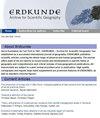不同性能指标和气候模式加权对全球和区域降水和温度趋势格局的影响
IF 1.1
4区 社会学
Q3 GEOGRAPHY
引用次数: 1
摘要
摘要:气候研究的一项主要任务是提供全球变暖条件下未来气候变化的估计。这方面的主要工具是动态气候模型。然而,不同的模型在产生的气候变化信号方面存在数量上的差异,在某些方面甚至是质量上的差异。在这项研究中,通过在基于四个复杂指标的多个区域和变量的标准化设置中评估气候模型来解决未来气候的这种不确定性。根据模型的表现对其进行加权将有助于提高对气候模型预测的信心。全球和区域气候模型针对模拟的季节性降水量和温度的50年趋势进行了评估。比较了这些评估的结果,并分析了它们在用作加权因子基础时对降水和温度概率预测的影响。这项研究在两个空间尺度上进行:七个全球分布的大型研究区域和八个地中海地区的亚区域。根据ERA-20C再分析,总共评估了62多个全球气候模型,其中159个是降水瞬态模拟,119个是四次排放的温度瞬态模拟。结果表明,四分之三的受访者之间存在很大的一致性。第四个涉及一个新的气候模型特征,该特征与任何其他排名都没有相关性。总的来说,特别是温度显示出与参考数据集的高度一致,而降水提供了更好的加权潜力。由于差异很小,这些指标更适合用于绩效排名,而不是作为权重因素。最后,与之前的模型评估研究一致:模型性能和概率气候预测加权的含义都严格取决于本文章由计算机程序翻译,如有差异,请以英文原文为准。
Effect of diversified performance metrics and climate model weighting on global and regional trend patterns of precipitation and temperature
Summary : A main task of climate research is to provide estimates about future climate change under global warming conditions. The main tools for this are dynamic climate models. However, different models vary quantitatively - and in some aspects even qualitatively - in the climate change signals they produce. In this study, this uncertainty about future climate is tackled by the evaluation of climate models in a standardized setup of multiple regions and variables based on four sophisticated metrics. Weighting models based on their performance will help to increase the confidence in climate model projections. Global and regional climate models are evaluated for 50-year trends of simulated seasonal precipita - tion and temperature. The results of these evaluations are compared, and their impact on probabilistic projections of precipitation and temperature when used as bases of weighting factors is analyzed. This study is performed on two spatial scales: seven globally distributed large study areas and eight sub-regions of the Mediterranean area. Altogether, over 62 global climate models with 159 transient simulations for precipitation and 119 for temperature from four emissions sce - narios are evaluated against the ERA -20C reanalysis. The results indicate large agreement between three out of four met - rics. The fourth one addresses a new climate model characteristic that shows no correlation to any other ranking. Overall, especially temperature shows a high agreement to the reference data set while precipitation offers better potential for weighting. Because of the differences being rather small, the metrics are better suited for performance rankings than as weighting factors. Finally, there is conformity with previous model evaluation studies: both the model performance and the implications of weighting for probabilistic climate projections strictly depend
求助全文
通过发布文献求助,成功后即可免费获取论文全文。
去求助
来源期刊

Erdkunde
地学-自然地理
CiteScore
2.00
自引率
7.10%
发文量
17
审稿时长
>12 weeks
期刊介绍:
Since foundation by Carl Troll in 1947, ''ERDKUNDE – Archive for Scientific Geography'' has established as a successful international journal of geography. ERDKUNDE publishes scientific articles covering the whole range of physical and human geography. The journal offers state of the art reports on recent trends and developments in specific fields of geography and comprehensive and critical reviews of new geographical publications. All manuscripts are subject to a peer-review procedure prior to publication. High quality cartography and regular large sized supplements are prominent features of ERDKUNDE, as well as standard coloured figures.
 求助内容:
求助内容: 应助结果提醒方式:
应助结果提醒方式:


